
Benchmark values and test results …
Let us now turn to the benchmark results. The test results for SATA3 drives are compared with an ASRock 890GX Extreme3 motherboard and the test results for mSATA and M.2 modules are performed with an ASRock Z97 Extreme6 motherboard. Microsoft Windows 7 Ultimate Edition is currently used as the operating system.
With the following SSD benchmark software, the drive was checked for possible speed and compared:
AS SSD Benchmark – Download
ATTO Disk Benchmark – Download
CrystalDiskMark – Download
HD Tach – Download
SiSoftware Sandra – Download
The AS SSD benchmark results provide a very good indication of the maximum possible read and write speed, the speed of smaller files and their respective access time. By the way, 4K means that small 4K blocks are read or written and with the 4K 64Thrd this is distributed to 64 threads at the same time. For example, the benchmark program simulates a typical program start.
We didn’t get off to a very good start with the Samsung SSD 860 PRO and EVO SSDs, because unfortunately the firmware seems to have problems with the older AMD test system, which we have been using since the beginning of our SATA SSD tests, in order to be able to deliver a 100% comparison of the SSDs.
The 4K 64Thrd benchmark of the Samsung 860 Pro 512 GB SSD takes an extremely long time with the AMD 890GX motherboard and with the Samsung Magician Tool, the benchmark even breaks off with a time limit.
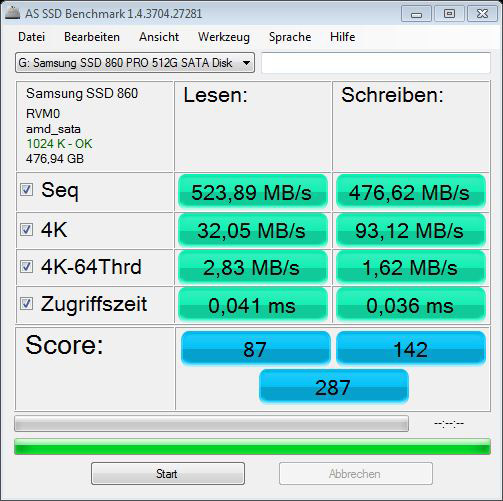
The Samsung SSD 860 Evo 500 GB with the AMD 890GX motherboard is not different.
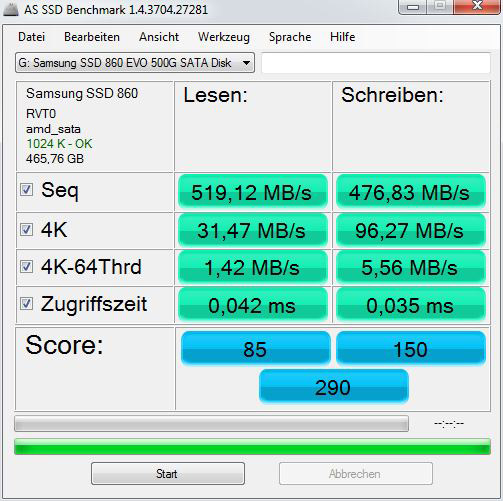
For this reason, we decided to run all benchmarks on the newer Intel test system, so that both SSDs ran perfectly.
The Samsung SSD 860 Pro 512 GB and the Samsung SSD 860 Evo 500 GB achieve very high sequential read and write speeds in the AHCI. The overall score of the Samsung SSD 860 Pro 512 GB is 1203 points and the overall score of the Samsung SSD 860 Evo 500 GB with 1206 points is enormously high!
The usable capacity of the Samsung SSD 860 Pro 512 GB is 476.94 GB and the Samsung SSD 860 Evo 500 GB is 465.76 GB. With some versions of Samsung Magician Tool, you can customize the over-provisioning range of many Samsung SSDs and determine how long you want to set the SSD durability vs. performance.
Tip:
Who now think about changing the SATA port in the BIOS from native / legacy IDE to AHCI, should first change for example only one part of the SATA port, where the drive with the operating system is not installed, if this is supported by the motherboard. Because if one like to save the new Windows installation, one must install the hard disk controller driver before changing SATA mode from IDE to AHCI – alternatively there are also Registry entries for it. If you like to upgrade from HDD to SSD, you should not copy the content 1:1 only with a tool like Norton Ghost or Acronis Backup. It is better to install a fresh Windows 7, Windows 8 or Windows 10 or adjust at least the SSD Alignment. We help you with questions to this topic or all other PC related questions at any time 24/7 in our German and English PC Forum.
Here is a screenshot of the AS SSD benchmark results (Samsung SSD 860 Pro 512 GB SATA3 AHCI):
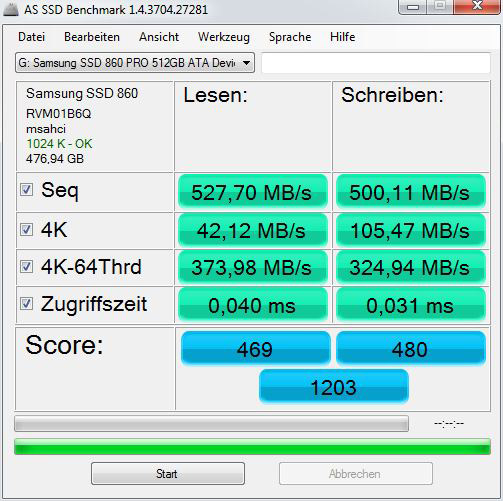
Here is a screenshot of the AS SSD benchmark results (Samsung SSD 860 Evo 500 GB SATA3 AHCI):
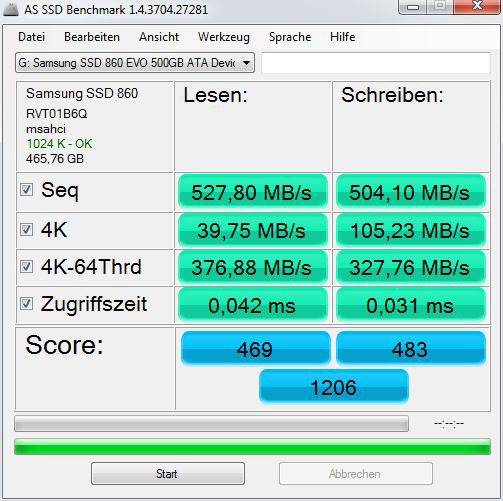
Here is a screenshot of the AS SSD iops results (Samsung SSD 860 Pro 512 GB SATA3 AHCI):
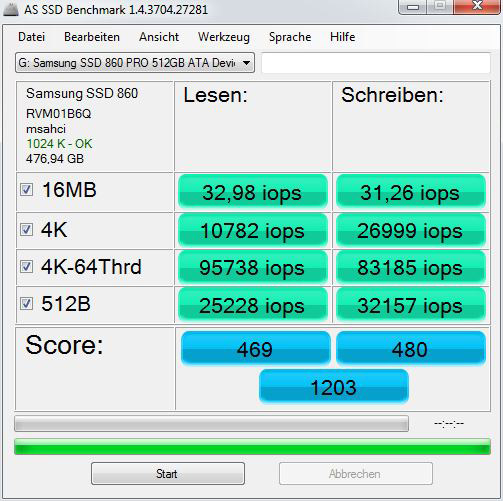
Here is a screenshot of the AS SSD iops results (Samsung SSD 860 Evo 500 GB SATA3 AHCI):
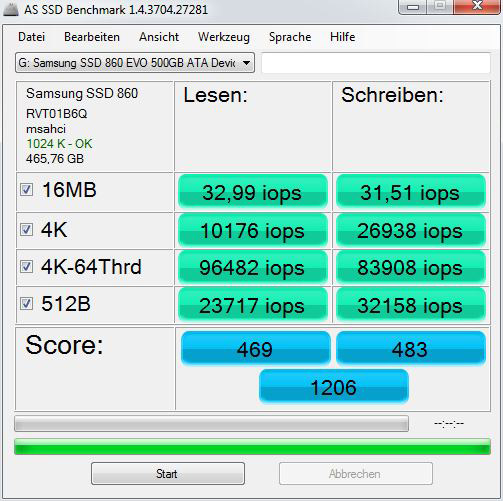
Here is a screenshot of the AS SSD copy benchmark results (Samsung SSD 860 Pro 512 GB SATA3 AHCI):
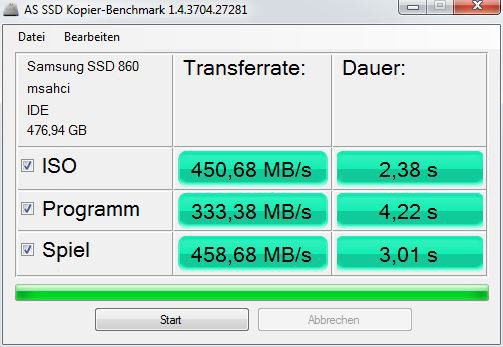
Here is a screenshot of the AS SSD copy benchmark results (Samsung SSD 860 Evo 500 GB SATA3 AHCI):
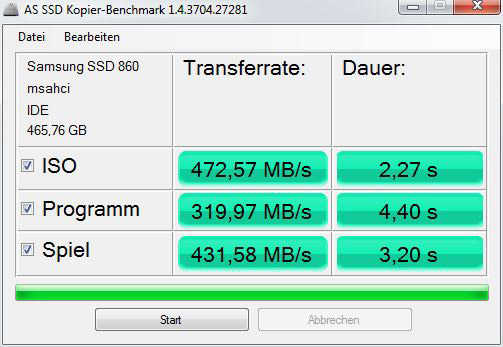
The comparison of the AS SSD benchmark results is extended with each new HDD/SSD review. You can already see some SSDs in comparison to the Samsung SSD 860 Pro or Samsung SSD 860 Evo, whereby the graphics is updated regularly with new SSD drives. At the time of testing, the top of the AS SSD overall score is led by the Samsung 960 Pro 1TB M.2 NMVe SSD, followed by further M.2 SSDs and RAID0 SSDs, followed by the Samsung SSD 860 Pro and Samsung SSD 860 Evo with almost identical results.
Here is a comparison of the AS SSD benchmark results, which are gradually extended with new drives:
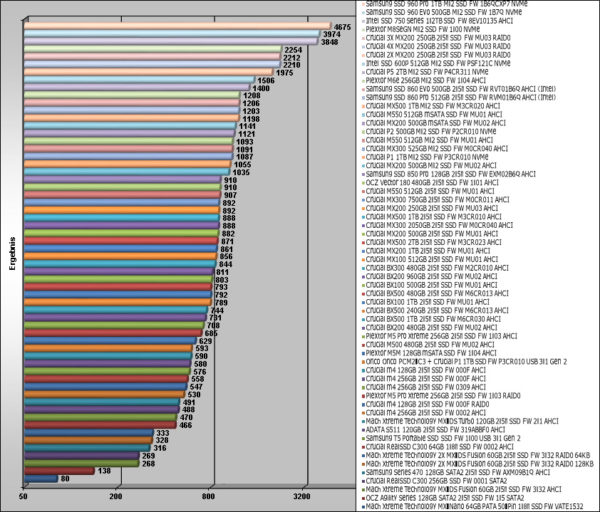
And here is an excerpt of the most recent AS SSD benchmark results for a better overview, which will gradually be replaced with the latest drives:
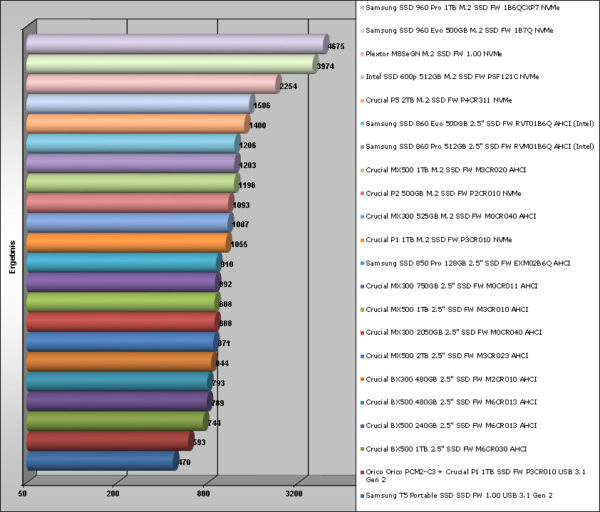 “.
“.
The ATTO Disk Benchmark results give a very good overview of the read and write speed for different file sizes. However, the measured results are maximum results that should not be confused with continuous transfer rates, as this benchmark can be higher even for SSDs with slower overall performance.
With the Samsung SSD 860 Pro and Samsung SSD 860 Evo, the reading speed (green) is already higher than the writing speed (red) from a transfer size of approx. 0.5KB and reaches the maximum reading results of 564467KB with a transfer size of 512KB. This means that the Samsung SSD 860 EVO and PRO are almost equal, at least according to the benchmark result!
Here is a screenshot of the ATTO Disk Benchmark results (Samsung SSD 860 Pro 512 GB SATA3 AHCI):
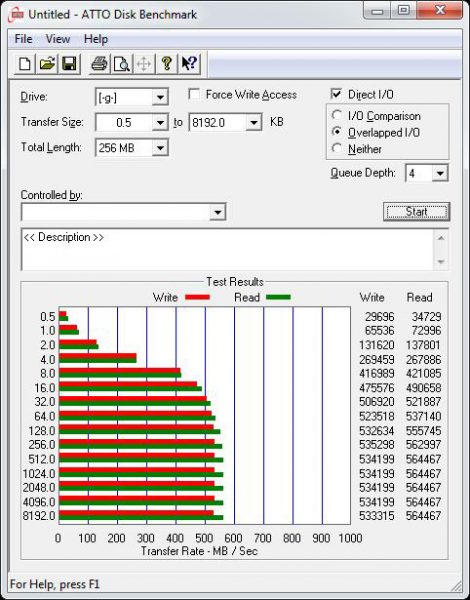
Here is a screenshot of the ATTO Disk Benchmark results (Samsung SSD 860 Evo 500 GB SATA3 AHCI):
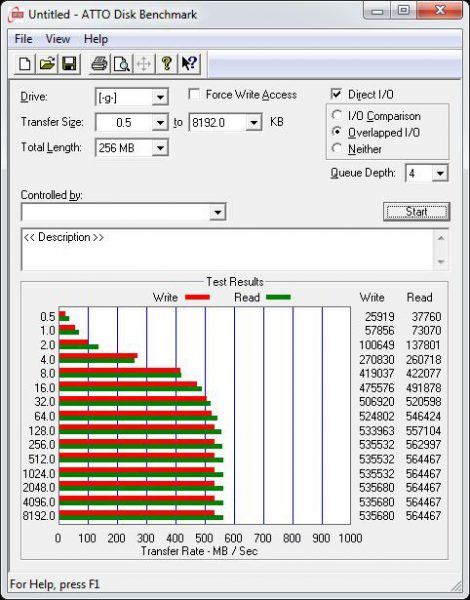
These ATTO Disk Benchmark results are now compared with a small transfer of 32KB and a large transfer of 8192KB. The bar chart already includes a comparison to some SSDs and hard drives, with the Samsung SSD 860 Pro and the Samsung SSD 860 Evo at ATTO in the upper midfield.
Here is a comparison of the ATTO Disk Benchmark results, which are getting updated with new drives:
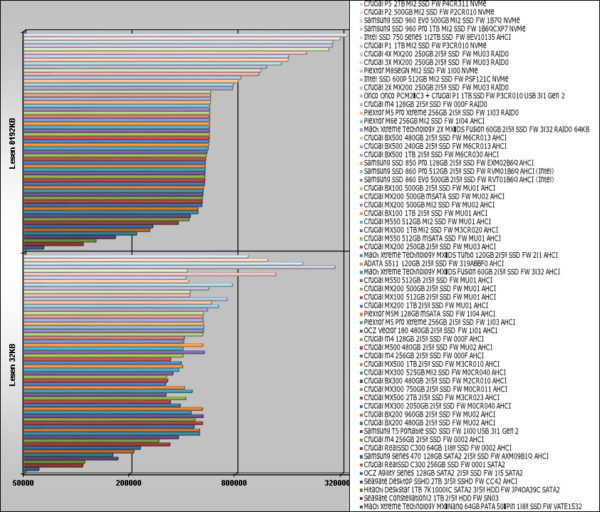
And here is an excerpt of the latest ATTO Disk Benchmark results for a better overview, which will gradually be replaced with the latest drives:
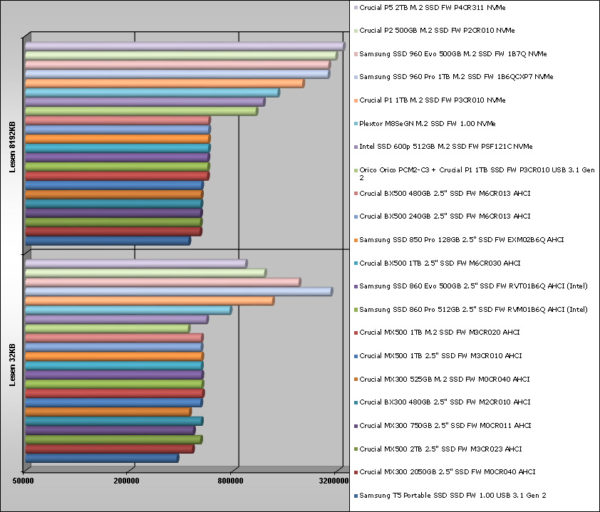 “.
“.
CrystalDiskMark also provides a balanced measurement of performance with different transfer sizes.
As before, the Samsung SSD 860 Pro 512 GB achieves extremely good sequential read rates of 544.9 MB/s and write speeds of 519.6 MB/s and 4K-64 threads for SATA3 drives. The Samsung SSD 860 Evo 500 GB has sequential read rates of 544.9 MB/s and write speeds of 521.0 MB/s and is even slightly higher.
Here is a screenshot of the CrystalDiskMark results (Samsung SSD 860 Pro 512 GB SATA3 AHCI):
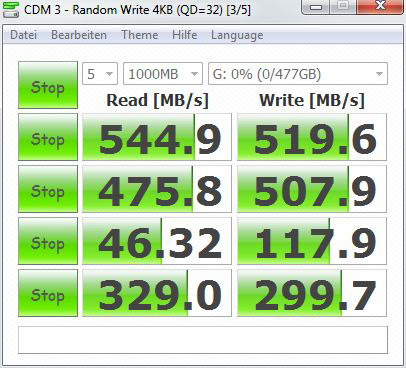
Here is a screenshot of the CrystalDiskMark results (Samsung SSD 860 Evo 500 GB SATA3 AHCI):
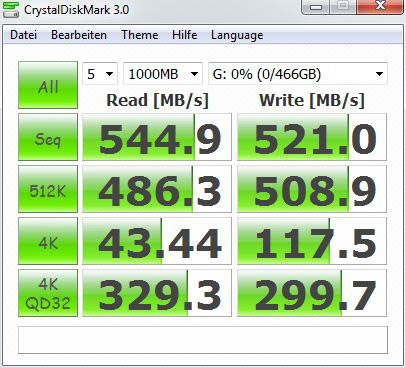
The following diagram shows the CrystalDiskMark results compared to the other SSDs and hard disks that are expanded step by step. The CrystalDiskMark comparison clearly shows the differences between the previously tested solid state drives and hard disks.
Here is a comparison of the CrystalDiskMark results, which will be extended step by step with further new drives:
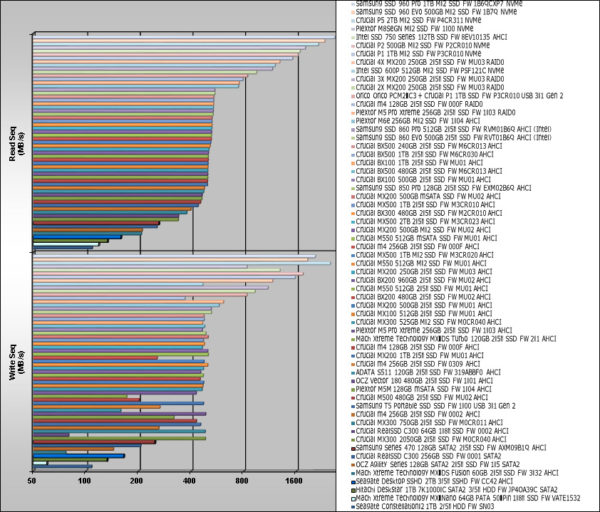
And here is an excerpt of the most recent CrystalDiskMark results for a better overview, which will gradually be replaced with the latest drives:
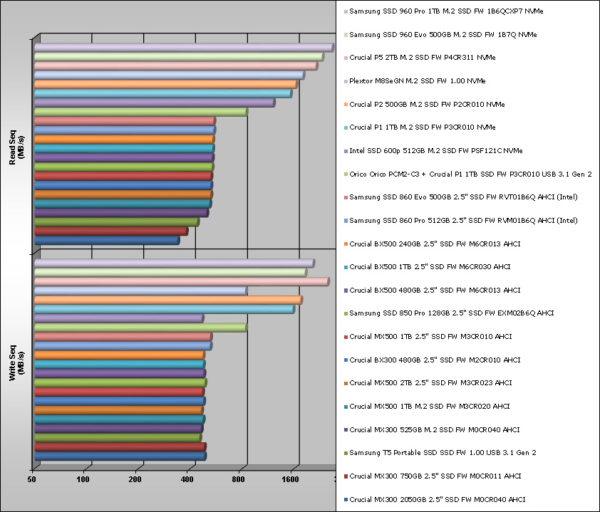 “.
“.
With the HD Tach Benchmark results you can easily see the performance of the SSD, which is very different to a conventional HDD. Due to the innovative logical management of the SSD controllers when accessing the NAND cells, the results can fluctuate with HD Tach version 3.0.4.0 designed for hard disks as with similarly structured SSDs.
With the Samsung SSD 860 Pro in AHCI mode, HD Tach shows a normal continuous transfer image with the lowest displayed access time of 0.0ms. And even during the writing process there are very even transfer rates with light peaks. The development of the Samsung SSD 860 Evo is not quite so calm in the long comparison.
For comparison, you can move the mouse pointer over the following drives to see the respective benchmark results:
Samsung SSD 860 Pro 512 GB SSD an Intel SATA3 AHCI, Samsung SSD 860 Evo 500 GB SSD an Intel SATA3 AHCI, ADATA S511 120GB SSD, ADATA S511 120GB SSD, Crucial BX300 480GB 2.5″ SSD, Crucial BX200 960GB 2.5″ SSD, Crucial BX200 480GB 2.5″ SSD, Crucial BX100 1TB 2.5″ SSD, Crucial BX100 500GB 2.5″ SSD, Crucial MX100 512GB 2.5″ SSD, Crucial MX200 1TB 2.5″ SSD, Crucial MX200 500GB 2.5″ SSD, Crucial MX200 500GB M.2 SSD, Crucial MX200 500GB mSATA SSD, Crucial MX200 250GB 2.5″ SSD, 2x Crucial MX200 250GB 2.5″ SSDs RAID0, 3x Crucial MX200 250GB 2.5″ SSDs RAID0, 4x Crucial MX200 250GB 2.5″ SSDs RAID0, Crucial MX300 750GB 2.5″ SSD, Crucial MX300 525GB M.2 SSD an SATA3 AHCI, Crucial MX300 2050GB 2.5″ SSD, Crucial M500 480GB 2.5″ SSD, Crucial M550 512GB 2.5″ SSD, Crucial M550 512GB M.2 SSD, Crucial M550 512GB mSATA SSD, 2x Crucial m4 128GB 2.5″ SSD an SATA3 RAID, Crucial m4 128GB 2.5″ SSD, Crucial m4 128GB 2.5″ SSD an SATA3, Crucial m4 256GB 2.5″ SSD FW 000F, Crucial m4 256GB 2.5″ SSD FW 0309, Crucial m4 256GB 2.5″ SSD FW 0002, Crucial m4 256GB SSD FW 0309 an SATA3 IDE, Crucial m4 256GB 2.5″ SSD FW 0002 an SATA3, Crucial C300 64GB 1.8″ SSD an SATA3, Crucial RealSSD C300 256GB 2.5″ SSD an SATA3, Crucial RealSSD C300 256GB 2.5″ SSD an SATA2, Hitachi 7K1000.C 1TB HDD, Intel SSD 750 1200GB PCIe Karte Gen3 x4, Intel 600p 512GB M.2 NVMe SSD an SATA3 AHCI, MX-DS Fusion 60GB SSD SATA3 IDE, MX-DS Fusion 60GB SSD SATA3 IDE, MX-DS Turbo 120GB SSD, OCZ Agility 128GB SSD, OCZ Vector 180 480GB 2.5″ SSD, Plextor M8SeGN 512GB M.2 NVMe SSD, Plextor M6e 256GB M.2 SSD PCIe AHCI, 2x Plextor M5 Pro Xtreme 256GB 2.5″ SSD an SATA3 RAID0, Plextor M5 Pro Xtreme 256GB 2.5″ SSD, Plextor M5M 128GB mSATA SSD, Samsung 960 Evo 500GB M.2 PCIe NVMe Gen3 x4 SSD, Samsung 960 Pro 1TB M.2 PCIe NVMe Gen3 x4 SSD, Samsung Series470 128GB SSD AHCI, Samsung 470 128GB SSD Legacy IDE, Samsung 850 Pro 128GB 2.5″ SSD, Samsung T5 Portable 500GB USB 3.1 SSD, Seagate Constellation.2 1TB 2.5″ HDD an SATA3, Seagate ST2000DX001 2TB 3.5″ SSHD, Toshiba MK8007GAH 1.8″ HDD.
Here is a screenshot of the HD Tach benchmark results:
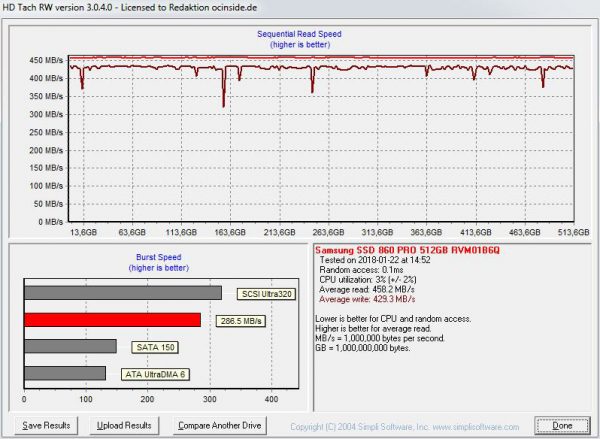
To see how the new 2-bit V-NAND Flash behaves on a larger file transfer, we’ve done the lengthy full-bench, which remains high with the Samsung 860 Pro 512 GB SSD.
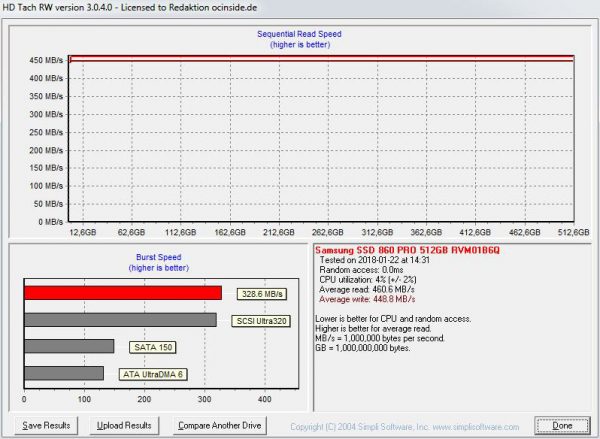
Now we finally see a difference between the Samsung SSD 860 Pro and the 860 Evo SSD! After longer write rates (more precisely after the 22 GB TurboWrite Cache) the Samsung SSD 860 Evo 500 GB SSD has a drastic drop in write rates of about 50 percent!
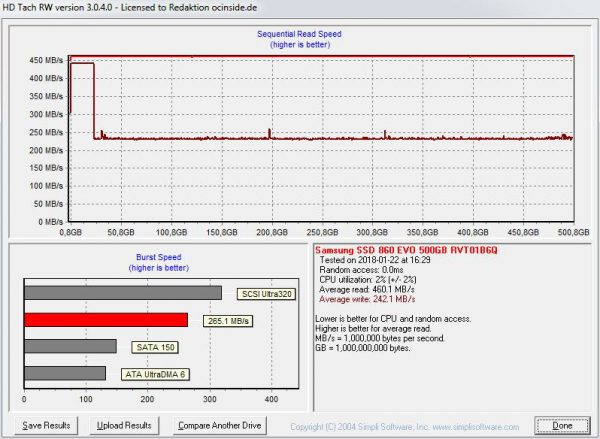
Please note that the TurboWrite cache of the EVO series varies in size depending on the capacity. The following table shows the different sizes and speeds according to the manufacturer Samsung (Source: Samsung).

Here is a comparison of the HD Tach benchmark results, which are gradually being extended with new drives:
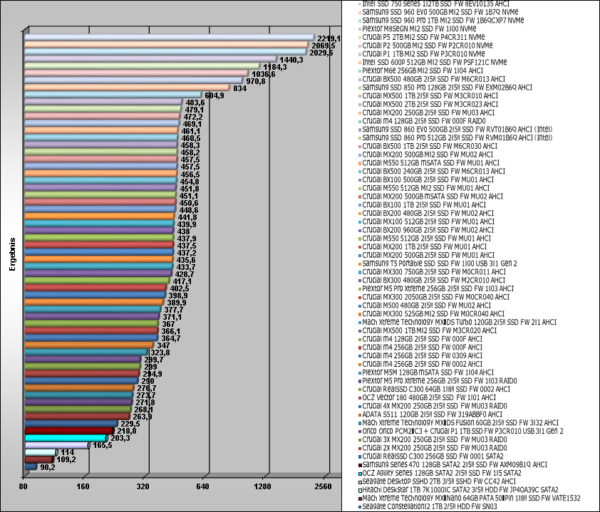
For a better overview, here is an extract of the latest HD Tach benchmark results, which will gradually be replaced with the latest drives:
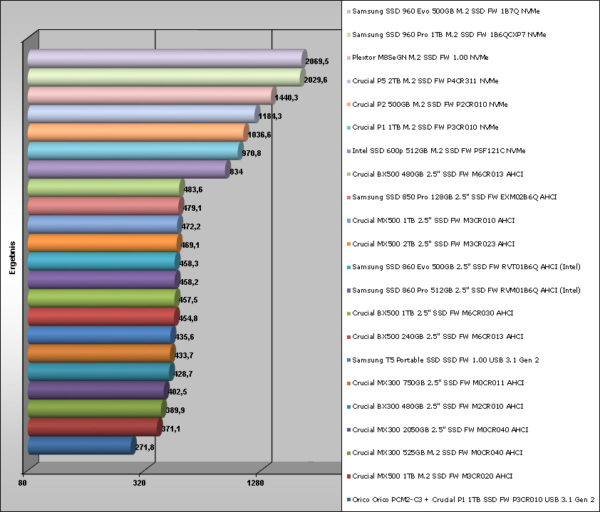 “.
“.
SiSoftware Sandra benchmark results
Of course, SiSoftware Sandra benchmark should not be missing in this test series. SiSoftware offers with their SiSoft Sandra program a very comprehensive tool, which contains a lot of tools to get very reliable test results of all hardware components.
The average access time of the Samsung SSD 860 Pro was very low for SiSoftware Sandra with 90us and the drive index of 536.82 MB/s is very high for a SATA SSD, whereas the Samsung SSD 860 Evo benchmarks are almost identical.
Here is a screenshot of the SiSoftware Sandra benchmark read results (Samsung SSD 860 Pro SATA3 AHCI):

Here is a screenshot of the SiSoftware Sandra benchmark read results (Samsung SSD 860 Evo SATA3 AHCI):

For the SiSoftware Sandra write performance measurement, the average access time of the Samsung SSD 860 Pro was extremely low 19us and the drive index reached a very good 491.45 MB/second. The Samsung SSD 860 Evo benchmarks are almost identical again.
Here is a screenshot of the SiSoftware Sandra benchmark write results (Samsung SSD 860 Pro SATA3 AHCI):

Here is a screenshot of the SiSoftware Sandra benchmark write results (Samsung SSD 860 Evo SATA3 AHCI):

Here is a comparison of the SiSoftware Sandra benchmark results, which will gradually be extended with other new drives:
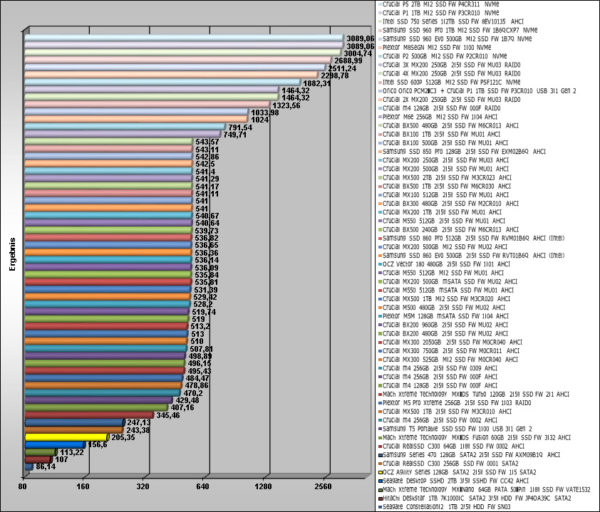
And here is an excerpt of the latest SiSoftware Sandra benchmark results, which will be replaced with the latest drives for a better overview:
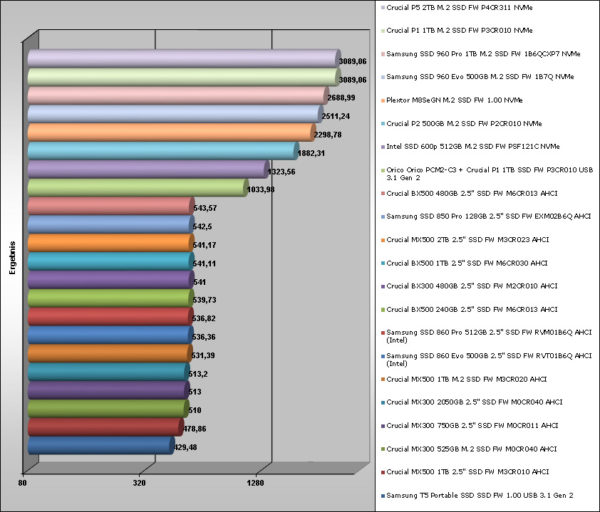
Samsung SSD 860 Pro and 860 Evo Conclusion and overall impression …

